Energy policy is more than a technical checklist of megawatts and infrastructure; it is the very foundation upon which inclusive and sustainable development is built.
A nation’s energy choices shape its economic trajectory, social equity and environmental health.
The World Bank Group, a key player among the Bretton Woods institutions, has long positioned itself as a champion of development and poverty alleviation.
But a new joint report by ActionAid Ghana and the Centre for Research on Multinational Corporations (SOMO) launched to coincide with the IMF and World Bank Spring meetings reveals a different and troubling story.
Over the past decade, the World Bank has facilitated and financed energy investments in Ghana that have entrenched fossil fuel dependency, fostered corporate profiteering, and burdened the state with unsustainable debt.
$2 Billion burden
At the heart of the report is a stark figure: $2 billion.
That is the amount of World Bank funding directed into Ghana’s oil and gas sector—channelled through mechanisms such as public-private partnerships (PPPs), sovereign guarantees and investment-friendly reforms.
Far from ushering in an era of energy security or economic growth, these investments have generated a series of contracts and obligations that now threaten Ghana’s fiscal sovereignty.
Rigid "take-or-pay" gas contracts, backed by World Bank guarantees, have forced the Ghanaian government to pay international energy companies for gas it could not use—year after year.
Power purchase agreements, skewed in favour of foreign investors, have locked the country into paying for electricity that was unaffordable for most citizens.
Energy for whom?
The World Bank’s energy investment model in Ghana, and across the Global South, is grounded in the belief that foreign-led private investment is the most efficient way to meet growing energy needs.
But what this model consistently fails to answer is: energy for whom?
Certainly not for the communities in rural northern Ghana who still rely on firewood and kerosene.
Not for women who wake up before dawn to walk miles in search of fuel or water.
Not for local businesses crippled by power outages and erratic tariffs.
In short, not for the people.
Meanwhile, oil giants such as Chevron, ENI, Tullow and Shell have reaped the profits, enjoying World Bank-backed financial guarantees, insulating them from financial risks.
Debt, dependence
One of the most alarming consequences of this fossil fuel lock-in is the massive debt burden it has created.
The structure of PPPs and energy contracts—designed under the guidance of the World Bank—places financial risk squarely on the shoulders of the Ghanaian state.
When demand forecasts are wrong, when consumption is lower than predicted, or when global energy prices fluctuate, it is the Ghanaian taxpayer—not the multinational company—who picks up the bill.
Ghana’s current energy debt is not the result of reckless spending or mismanagement alone.
It is the predictable outcome of an international financing system that offloads risk onto poor countries while extracting profit for global investors.
This is not partnership, it is predation.
Call to action
The ActionAid Ghana-SOMO report is not just an exposé; it is a call to action. It offers a series of urgent and concrete recommendations to reverse the tide of fossil fuel dependency and reorient the country’s energy strategy toward justice, sustainability and public good.
These include:
• An independent audit of Ghana’s fossil fuel-related debt to determine the full scope of obligations and identify areas for renegotiation or cancellation.
• A moratorium on new fossil fuel investments, including oil, gas and coal projects, and a shift in public and international finance towards renewable and decentralised energy systems.
• The reassessment of all existing energy contracts, particularly those that transfer financial risk from corporations to the state, and which undermine Ghana’s ability to pursue long-term, people-centred development.
• A national dialogue that brings together government, civil society, women’s groups, labour unions and communities to co-create a new energy policy framework rooted in climate justice and democratic governance.
Path forward: People over profit
ActionAid Ghana and SOMO are unequivocal in our belief that Ghana’s energy future must be climate-resilient, democratically governed, and free from exploitative fossil fuel arrangements.
We call on the government of Ghana to demonstrate bold leadership by breaking with the damaging energy paradigms of the past and embracing a just transition to renewable energy that works for all—not just the wealthy and powerful.
We call on the World Bank and other international financial institutions to recognise the profound harm their policies have caused and to support—not hinder—countries such as Ghana in charting a new path.
This means cancelling illegitimate fossil fuel debts, ending support for new fossil infrastructure, and investing in renewable energy systems that are public, equitable and accountable.
And we call on the Ghanaian people—civil society, media, academia, traditional leaders and ordinary citizens—to demand transparency, fairness and justice in the decisions that will shape our future.
Time running out
The global energy transition is no longer a question of if, but when.
The real question is how—and for whom—this transition will unfold.
Ghana stands at a crossroads. One path leads to deeper debt, greater inequality, and environmental destruction.
The other leads to energy sovereignty, economic resilience and social equity.
The writers are with ActionAid Ghana & Centre for Research on Multinational Corporations (SOMO), respectively.

